Are school districts responsible for the costs of maintaining, repairing or replacing a student’s assistive technology device, even if it is not school-owned?
When an assistive technology device is part of a student’s Individualized Education Plan (IEP), the school has the responsibility for making certain the device is available for purposes of implementing the student’s IEP. In most cases, the school is liable for the costs of maintenance, repair or replacement of the device even when it is not owned by the school.
The Office of Special Education Programs (OSEP), in response to a request from the Illinois Assistive Technology Project, addressed this issue in a 1994 policy letter. The request involved an augmentative communication device which parents of a student purchased so that their son was “able to access the device continually” rather than being limited to use for IEP-designated activities only.
In its letter, OSEP stated, “…if the device that the parents have agreed to furnish is no longer in working order, and therefore is no longer available for purposes of implementing the student’s IEP, the public agency is responsible for either continuing to implement the student’s IEP by providing a substitute device, or for reconvening the student’s IEP team for purposes of reviewing the student’s IEP, and if appropriate, revising its provisions.” In other words, the district has only two options: provide a fully operational device as written in the IEP (either repair the existing device or replace it with an equivalent one) or revise the IEP.
Under the Individuals with Disabilities Education Act (IDEA), a school district is responsible for providing assistive technology devices that are part of a child’s special education, related services or supplementary aids and services. The device is to be provided at no cost to parents. If the parents in this case had not purchased the device specified in their child’s IEP, the school district would be responsible for both providing and maintaining the device.
The OSEP letter recognizes that there may be some situations in which having the school assume liability for a non school-owned device may “create a greater responsibility for the public agency than the responsibility that exists under federal law”. For example, a school could choose to use a family-owned captioning decoder to allow a student to watch instructional television programming at school. However, since this decoder would receive much use at home for “non-IEP” purposes, the school may not want to use it to meet IEP needs and thus assume liability for its overall maintenance. Rather, it may be more effective for the school to own a decoder that could be used at school and sent home only when the student was assigned to watch a program during off-school hours.
With both school-owned devices and those that schools are obligated to maintain, school personnel are frequently concerned about damage that may occur off school property, since they have limited ability to oversee the care and use of the device once it leaves the school. Regardless of these concerns, the mandate to provide devices off-property is clear. Schools cannot limit devices to in-school use because of anticipated or real fears of damage. Rather, schools must examine the specified IEP goals necessitating the equipment leave school, consider all equipment alternatives, and then provide that which is needed for FAPE. As with all decisions related to assistive technology, each must be made on a case-by-case basis considering the unique educational needs of the student.
Whatever the approach, the basic responsibility for the school still remains: assure access to working equipment as needed per the IEP. Depending on the circumstances, a school may choose to assume maintenance liability of a non-school owned device, or it may be more effective for the school to own a duplicate or comparable device for which it retains sole ownership and maintenance responsibility, rather than becoming entangled in maintaining equipment that it doesn’t own.
To receive a copy of the OSEP policy letter or if you have questions about other assistive technology issues, contact Missouri Assistive Technology via email.

